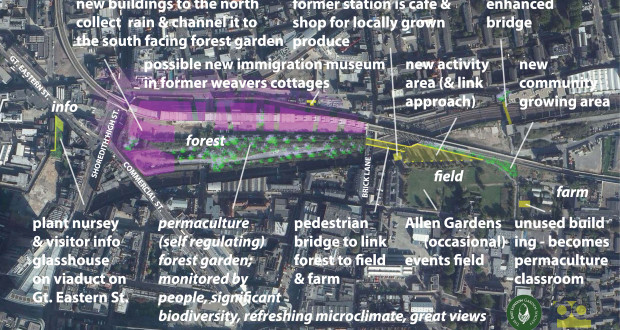Geoff Juden, Chair of the East London Garden Society, looks at the Bishopsgate Goods Yard Development. The community has asked for Weavers Shoreditch Woods to be created: why have the developers refused?
We who live in the Shoreditch area of London are to have major developments around us consisting of very large tower blocks: the Bishopsgate Goods Yard is just one. Within this development, the developers have to create a community park on top of railway arches which are approximately half a mile long – 200 ft at it’s broadest, tapering to 60ft at the Brick Lane end. The design consortium brought in to oversee the design of the community park had a remit to consult with the community as to what kind of park would be required: replies included a wild area, where children could play; a growing area; and an area which could sustain.
The park design is a woodland area with children’s natural play – so they imagine a children’s climbing structure in the woodland, a horticultural area next to the woodland concept, an exhibition space, a building in the sky imitating a signal box, a plinth with various interchangeable sculptures, a shop, a cafe. As explained to the design consortia, Shoreditch is overburdened with air pollution, therefore a park would best serve the community by ensuring it would have a positive impact on the situation. They wish to build bug hotels, together with bird boxes.
The East London Garden Society, with others, meeting with the developers had gained no ground on a park suiting the area, reducing air pollution, a community growing Forest Garden, based on permaculture principles. We further pointed out inherent flaws with the park design.
•You will need (rule of thumb) 25% extra capacity for each of the areas for management.
•There must be an integrated water system to attend the needs of the park.
•As much as you will require the natural bugs and beasties in the woodland area, next door you will try to eradicate them (it being an horticultural area).
•Although the area is south facing, heat will be deflected by the tall buildings exacerbating the plant stress levels.
We could go on forever about the inherent failures of this park. As we all know, the United Kingdom, if left to itself, would revert to a natural forest. It’s just that the developers have no wish to placate the local community with what would be the largest Forest Garden in United Kingdom, in the most perfect place, helping to reduce the air pollution, a permaculture school in central London. As Hammersons & Ballymore have stated, you cannot place trees there, you cannot have it all a forest.
There is a saying – “ignorance is bliss”. The developers are happy with the original concept, alien to the people’s needs. They will have made their money and left – and the locality will have to pick up the pieces on a failed park, just because at the consultations they did not want to listen.
•The East London garden Society has a petition online at www.elgs.org.uk.
Drawings supplied by JB Project Architects, architects for sustainability
The developers of The Bishopsgate Goods Yard are Hammersons and Ballymore, two major construction companies in the United Kingdom. The design consortium is The Space Hub.
 East London News A Force for the community…
East London News A Force for the community…




